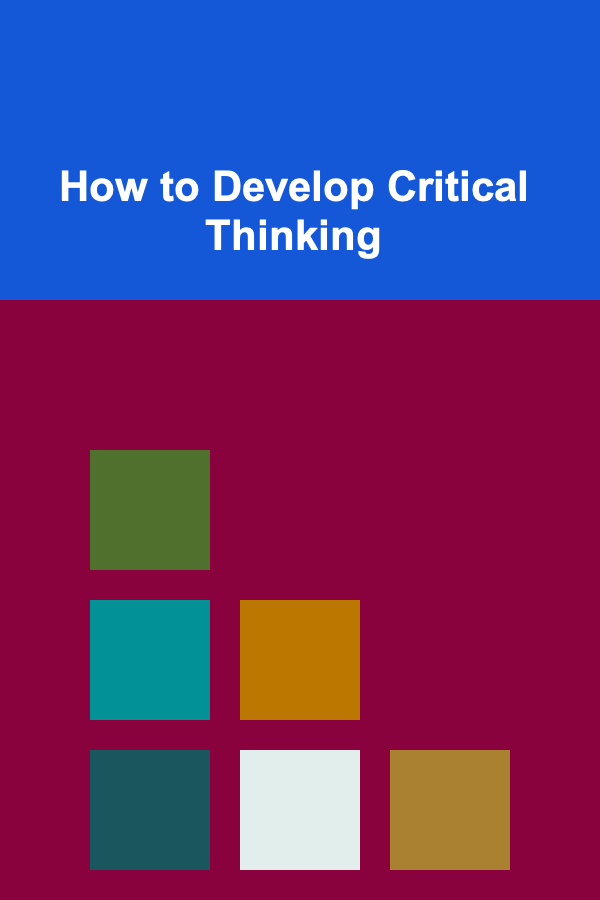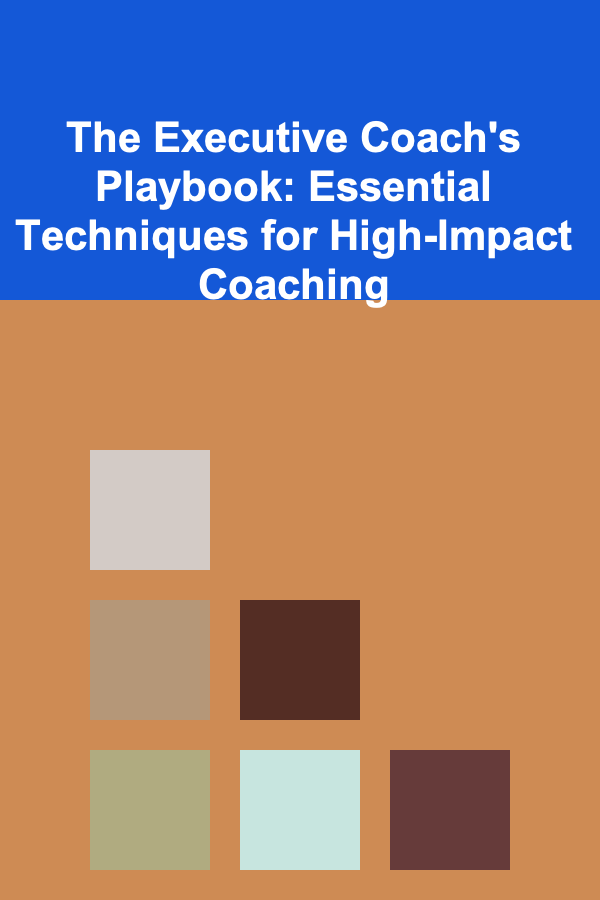
How to Develop Critical Thinking
ebook include PDF & Audio bundle (Micro Guide)
$12.99$9.99
Limited Time Offer! Order within the next:

Critical thinking is an essential skill that plays a central role in personal and professional growth. It is the process of objectively analyzing and evaluating information, ideas, or arguments to make reasoned judgments. In today's complex and fast-paced world, critical thinking has become more important than ever before. Whether you're navigating the vast amount of information on the internet, solving a problem at work, or making significant life decisions, the ability to think critically helps you assess situations from multiple perspectives, recognize biases, and come to well-informed conclusions.
However, critical thinking is not an innate ability---it is a skill that can be developed and honed over time. The goal of this article is to explore the components of critical thinking, its importance, and provide practical steps for developing and strengthening this invaluable skill.
Understanding Critical Thinking
Critical thinking is more than just an intellectual activity. It involves a set of cognitive skills that enable individuals to process information effectively, question assumptions, and evaluate the validity of claims. At its core, critical thinking requires the ability to:
- Analyze: Break down complex information into smaller, understandable components.
- Evaluate: Assess the quality, relevance, and credibility of information or arguments.
- Synthesize: Combine various pieces of information to form a coherent and well-supported conclusion.
- Reason: Use logic and evidence to support decisions or opinions, while identifying fallacies or biases.
1.1 The Components of Critical Thinking
Critical thinking encompasses various cognitive processes and skills, including:
- Interpretation: Understanding and explaining the meaning of information or ideas.
- Analysis: Identifying and examining the relationships, assumptions, and implications behind arguments.
- Inference: Drawing logical conclusions based on evidence and reasoning.
- Explanation: Clearly and effectively communicating your reasoning and conclusions to others.
- Evaluation: Assessing the strength of arguments, evidence, and conclusions, recognizing strengths and weaknesses.
The Importance of Critical Thinking
In a world where information is abundant and often conflicting, critical thinking allows individuals to cut through the noise and focus on what is meaningful. It helps people avoid being misled by false information, biased arguments, or faulty reasoning. Furthermore, critical thinking enables individuals to:
- Make informed decisions: With the ability to evaluate options, risks, and consequences, critical thinkers can make choices that align with their values and goals.
- Solve problems effectively: Critical thinkers are adept at analyzing complex problems, considering various solutions, and choosing the most effective approach.
- Communicate persuasively: By constructing logical, evidence-based arguments, critical thinkers are able to communicate their ideas more effectively to others.
- Enhance creativity: Critical thinking encourages new ways of looking at problems, fostering creative and innovative solutions.
- Foster independence: Critical thinkers can form their own judgments, instead of relying solely on others' opinions or the prevailing consensus.
The ability to think critically is essential in every aspect of life, whether it's in academics, career, relationships, or daily decision-making. It enables individuals to navigate uncertainty, make better choices, and contribute meaningfully to society.
Barriers to Critical Thinking
Despite its importance, there are several common obstacles that can hinder the development of critical thinking skills. Recognizing and overcoming these barriers is key to becoming a more effective critical thinker.
3.1 Cognitive Biases
Cognitive biases are systematic patterns of deviation from rational judgment. These biases often lead individuals to make decisions based on emotions, stereotypes, or preconceived notions, rather than objective evidence. Some common cognitive biases include:
- Confirmation Bias: The tendency to seek out or favor information that supports one's existing beliefs or opinions.
- Anchoring Bias: Relying too heavily on the first piece of information encountered when making decisions.
- Availability Bias: Making judgments based on information that is most readily available, often influenced by recent experiences or media coverage.
- Groupthink: The tendency to conform to group opinions or decisions, even when they may not be the best course of action.
Overcoming cognitive biases requires individuals to be aware of these tendencies and actively work to counter them by seeking diverse viewpoints, questioning assumptions, and considering alternative explanations.
3.2 Emotional Reactions
Strong emotions, such as fear, anger, or excitement, can cloud judgment and hinder rational thinking. Emotional responses may cause individuals to make impulsive decisions or dismiss evidence that contradicts their feelings. Practicing emotional regulation and mindfulness can help individuals separate their emotions from their reasoning, allowing for more objective and thoughtful analysis.
3.3 Lack of Knowledge or Information
Critical thinking requires access to accurate, reliable, and relevant information. A lack of knowledge or insufficient information can make it difficult to form well-rounded judgments. To overcome this barrier, individuals must be committed to continuous learning and actively seek out credible sources of information. Critical thinkers also recognize the limits of their knowledge and are open to seeking help or expertise when necessary.
3.4 Overreliance on Intuition
While intuition can be valuable in certain situations, overreliance on gut feelings can hinder critical thinking. Intuition may be shaped by past experiences or biases that are not always relevant to the current situation. Critical thinkers balance intuition with evidence and logic, using both to make informed decisions.
Steps to Develop Critical Thinking
Critical thinking is a skill that requires deliberate practice. Below are some practical steps you can take to develop and enhance your critical thinking abilities.
4.1 Cultivate Curiosity
Curiosity is the foundation of critical thinking. To think critically, you must be willing to ask questions, explore new ideas, and challenge existing beliefs. Curiosity drives the process of inquiry, encouraging individuals to seek out new information, consider multiple perspectives, and explore different angles of an issue.
Here are some ways to cultivate curiosity:
- Ask "why" and "how" questions: Instead of accepting things at face value, ask questions to understand the reasons behind them.
- Challenge assumptions: Examine your own beliefs and assumptions, and be open to questioning them.
- Seek out new perspectives: Engage with people who have different viewpoints and be open to learning from them.
4.2 Practice Active Listening
Active listening is an essential skill for critical thinking. It involves fully concentrating on what is being said, understanding the message, and reflecting on it before responding. Active listening allows you to absorb information more effectively and evaluate arguments with greater clarity.
To practice active listening:
- Focus on the speaker: Eliminate distractions and give the speaker your full attention.
- Avoid interrupting: Let the speaker finish their thoughts before responding.
- Ask clarifying questions: If something is unclear, ask for further explanation to ensure you fully understand the message.
- Reflect on what you hear: Take a moment to think about the message before responding.
4.3 Consider Multiple Perspectives
One of the hallmarks of critical thinking is the ability to consider different perspectives and viewpoints. When analyzing an issue or making a decision, it's important to examine all sides of the argument, even if they contradict your own beliefs.
To broaden your perspective:
- Engage with diverse viewpoints: Read articles, books, or watch videos that present opposing opinions to your own.
- Think from different angles: Try to understand the problem from the perspective of others, including those who may have different values or experiences.
- Question your own biases: Recognize the biases that may influence your thinking and challenge them.
4.4 Analyze Information Objectively
Critical thinkers must be able to evaluate information and arguments without being swayed by emotions or personal biases. This requires objectivity and the ability to assess evidence based on its credibility, relevance, and logic.
To analyze information objectively:
- Evaluate the source: Consider the credibility of the source of information. Is it reliable, unbiased, and authoritative?
- Examine the evidence: Look for supporting evidence that backs up claims or arguments. Is the evidence strong, relevant, and up-to-date?
- Identify assumptions and fallacies: Look for any underlying assumptions or logical fallacies that may weaken an argument.
4.5 Develop Problem-Solving Skills
Critical thinking is essential for solving problems effectively. It involves identifying the problem, analyzing the causes, considering potential solutions, and evaluating the outcomes.
To develop problem-solving skills:
- Break down the problem: Analyze the problem into smaller components to better understand its root causes.
- Consider multiple solutions: Brainstorm different possible solutions and weigh the pros and cons of each one.
- Evaluate the outcomes: Consider the potential short-term and long-term effects of each solution before making a decision.
4.6 Reflect on Your Thinking Process
Reflection is a powerful tool for developing critical thinking. By regularly assessing your own thought process, you can identify areas for improvement and refine your reasoning skills.
To reflect on your thinking:
- Keep a journal: Write about your decision-making process and the reasoning behind your conclusions.
- Seek feedback: Ask others for feedback on your ideas and reasoning, and use it to improve your critical thinking.
- Review past decisions: Reflect on past decisions and analyze what worked and what didn't, to learn from your mistakes.
Conclusion
Critical thinking is a vital skill that empowers individuals to navigate the complexities of life with clarity and confidence. By developing the ability to analyze, evaluate, and reason effectively, individuals can make better decisions, solve problems more creatively, and communicate more persuasively. While critical thinking may not come naturally to everyone, it is a skill that can be cultivated through curiosity, practice, and self-reflection.
As the world continues to change and become more interconnected, the importance of critical thinking will only grow. By actively working to develop this skill, we can better navigate the challenges we face, both personally and professionally, and make decisions that are grounded in reason, evidence, and thoughtful analysis.
Reading More From Our Other Websites
- [Home Lighting 101] How to Create a Mood Lighting Scheme for Movie Nights
- [Personal Care Tips 101] How to Choose a Body Wash That Supports Healthy Skin Aging
- [Needle Felting Tip 101] The Ultimate Guide to Choosing the Right Needles and Fibers for Perfect Felts
- [Horseback Riding Tip 101] Essential Safety Gear Every Rider Must Have
- [Home Maintenance 101] How to Protect Your Home from Seasonal Weather Damage
- [Stamp Making Tip 101] Materials & Tools Review: The Best Supplies for Perfect Linocut Stamps
- [Star Gazing Tip 101] Best Star‑Gazing Podcasts That Dive Deep into the Science Behind Light‑Year Distances
- [Home Party Planning 101] How to Plan a Game Day Party for Sports Lovers
- [Organization Tip 101] How to Create an Inspiring Workspace with Personal Touches
- [Organization Tip 101] How to Create an Art Display Wall for Finished Crafts

How to Maintain Consistency in File Organization
Read More
How to Use Color Coding for Recipe Categories
Read More
The Executive Coach's Playbook: Essential Techniques for High-Impact Coaching
Read More
How To Learn Object-Oriented Programming (OOP) Principles
Read More
How to Discover the Elgin Marbles Controversy
Read More
How to Budget for Freelancers with Irregular Income
Read MoreOther Products

How to Maintain Consistency in File Organization
Read More
How to Use Color Coding for Recipe Categories
Read More
The Executive Coach's Playbook: Essential Techniques for High-Impact Coaching
Read More
How To Learn Object-Oriented Programming (OOP) Principles
Read More
How to Discover the Elgin Marbles Controversy
Read More